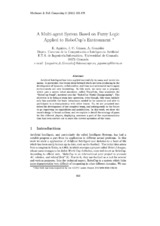Mostrar el registro sencillo del ítem
A multi-agent system based on fuzzy logic applied to RoboCup's enviroment
| dc.contributor.author | Aguirre Molina, Eugenio | |
| dc.contributor.author | Gámez Granados, Juan Carlos | |
| dc.contributor.author | González Muñoz, Antonio | |
| dc.date.accessioned | 2018-04-27T11:37:37Z | |
| dc.date.available | 2018-04-27T11:37:37Z | |
| dc.date.issued | 2001 | |
| dc.identifier.uri | http://hdl.handle.net/10396/16531 | |
| dc.description.abstract | Artificial Intelligent has been applied successfully to many and varied domains. In particular, the recent steps forward which are been producing in the development of dynamic, collaborative, real time and adversarial multi-agent environments are very interesting. In this work, we carry out a proposal, which uses a soccer robot simulator, called TeamBots, that simulates the "RoboCup Small'', involved into the "RoboCup World Championship''. The objective is to bring a team into operation, even though, this team initially only has available the basic behaviours needed to be operative and able to participate in a championship with other teams. So, we are proposed ourselves the development of the complete team, and subsequently in the future to go improving its capabilities and possibilities. In this work, we show the team's design in broad outlines, and we explain in detail the strategy of game for the different players, displaying moreover a part of the experimentation that has been carried out to state the correct operation of the team | es_ES |
| dc.format.mimetype | application/pdf | es_ES |
| dc.language.iso | spa | es_ES |
| dc.rights | https://creativecommons.org/licenses/by-nc-nd/4.0/ | es_ES |
| dc.source | Mathware & soft computing 8 (2), 153-178 (2001) | es_ES |
| dc.subject | Robot World Cup Initiative (RoboCup) | es_ES |
| dc.subject | RoboCup | es_ES |
| dc.subject | Inteligencia artificial | es_ES |
| dc.subject | Robots | es_ES |
| dc.title | A multi-agent system based on fuzzy logic applied to RoboCup's enviroment | es_ES |
| dc.type | info:eu-repo/semantics/article | es_ES |
| dc.relation.publisherversion | https://upcommons.upc.edu/handle/2099/1488 | es_ES |
| dc.rights.accessRights | info:eu-repo/semantics/openAccess | es_ES |

